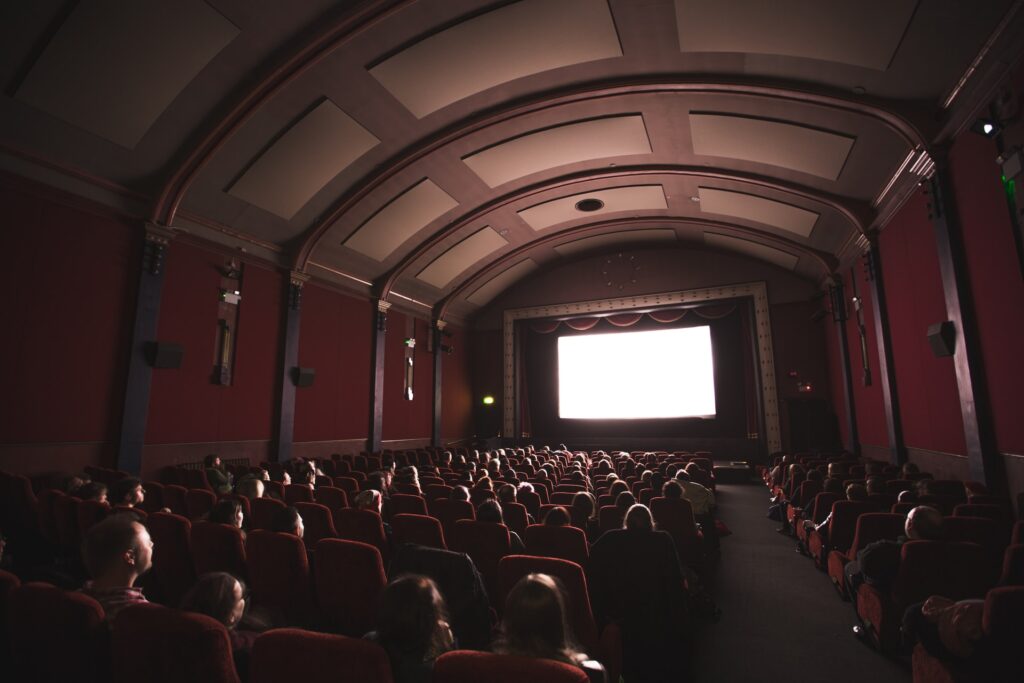
Jake Hills on Unsplash
When the far-reaching effects of COVID-19 became apparent and the UK lockdown began, we were all in a state of shock. Like many people, my default reaction was to look for ways to seek comfort and reassurance. Something to focus on, to distract from the realities of what was happening outside the safety of our homes, to ground me when everything felt scary and confusing.
I often find my comfort in watching films. There have been many times when I have reacted to emotional stresses by running away to the cinema. Because for at least 90 minutes I do not have to deal with what is happening. That wonderful feeling of escape when I take my seat in the darkened auditorium and get transported somewhere else for a while, and then emerge blinking into the daylight outside. I can spend time thinking about the film travelling home on the bus, carrying those reflections with me all the way to my front door. Cinema as therapy perhaps, or at least a suspension of the trials and tribulations of life.
But this time I could not physically flee to my usual place of solace, to the comforting and familiar environment of my favourite cinema and sink down into one of the plush red seats. If I was going to be stuck in the house, I would need an alternative escape plan.
I assumed I would reach instead for the comfort blanket of familiar films that I knew would either help to lift my spirits or invoke a well needed, big, snotty cry. The shelf full of well-worn DVDs was beckoning (yes, I am a physical media sort of person, I still buy CDs and vinyl too) containing the friends I know so well. I imagined myself enjoying re-watch after re-watch of old favourites, dressed in a big jumper and cocooned in a blanket on the sofa, like a character recovering from a break-up in a formulaic romcom.
But I haven’t actually found myself doing that at all. I have found my solace elsewhere, by signing up with a film screening service and watching all sorts of random, unfamiliar cinema. Instead of wallowing in nostalgia, I have liberated myself from my comfort film cocoon and flown away.
It seems I am not the only one who has sacrificed my email address for access to infinite film wonders. Several streaming services have reached out to potential lockdown customers with reduced subscription fees. Coupled with unlimited data offers from Wi-Fi providers, itself resulting in an increase in internet traffic as we all stayed at home, we have all reached for the remote. One report quoted that on-demand and streaming services traffic increased by a third during the early stages of lockdown, and apparently all the major streaming providers saw a three-figure percentage increase worldwide.
But I have not just replaced fetching an old DVD from the shelf with searching for the title on Netflix instead. I have taken out a subscription with MUBI and have been accessing the strange and unfamiliar. MUBI has a rolling curated list of 30 films showing over 30 days with a new film added and an old one removed every day. The idea behind their ethos is to take away the endless choices and narrow it down, with diverse and challenging suggestions. It works on human recommendation rather than an algorithm based on the fact you’ve previously watched 11 Adam Sandler films (or whatever floats you boat) like Netflix, or delving into the huge murky bucket full of titles on Amazon Prime.
The film choices are very much away from the mainstream: an eclectic collection of films spanning genres, languages and across decades. There are also supporting articles about the films, to stimulate discovery and discussion, a ready-made film club in your phone. It even groups the films for you into themes or strands, as if it was a film festival programme. It suits me right down to the ground.
My own reaction has surprised me. I normally like to have full control of my options, but right now, I like the idea of being told what I should be watching. The lack of choice takes away some anxiety for me. I have enjoyed feeling out of my comfort zone, and giving some control away. It can sometimes feel a bit like listening to a well-meaning but slightly patronising boyfriend who calls himself a ‘cinephile’ in his Twitter bio, and assumes he knows more than you. But I don’t mind that.

Sally V on Wikimedia Commons
Highlights of my watching have included Katharina Kastner’s ‘Villa Empain’, a Belgian Avant Garde silent short about an Art Deco museum building’s aesthetic, a one-woman Icelandic rallying cry against the environmental damage of modern technology, and Ida Lupino’s directing back catalogue. Oh, and a lot of French 1970s cop films starring Alain Delon. My obsession for the films of director Céline Sciamma has also intensified. Who doesn’t love a bit of female sexual identity and fluidity once in a while?
I think perhaps we are more likely to watch something challenging at home than we would be at the cinema. We might take more risks than if we were taking the time and effort to leave the house. There are fewer compromises to make than if you were meeting a friend, for example, and having to choose something you both like. As well as watching together, my partner and I have sometimes gone for quite different films when watching independently. We then reconvene and discuss what we have witnessed, or leave each other a note or a text, like reading a postcard from an exotic land.
By surrendering to streaming, I have given myself the chance to explore new worlds. I have immersed myself in something or somewhere different as a way of blocking out reality for a while. I have built myself an ‘out of my comfort’ zone, giving me an opportunity to re-group and energise myself before facing the real world again.
Filed under: Film, TV & Tech
Tagged with: amazon prime, challenging, column, comfort zone, consuming, Culture, dvd, film, lockdown, mainstream, Mubi, Netflix, niche, Remote, streaming, TV, watching, wifi, writing


Comments